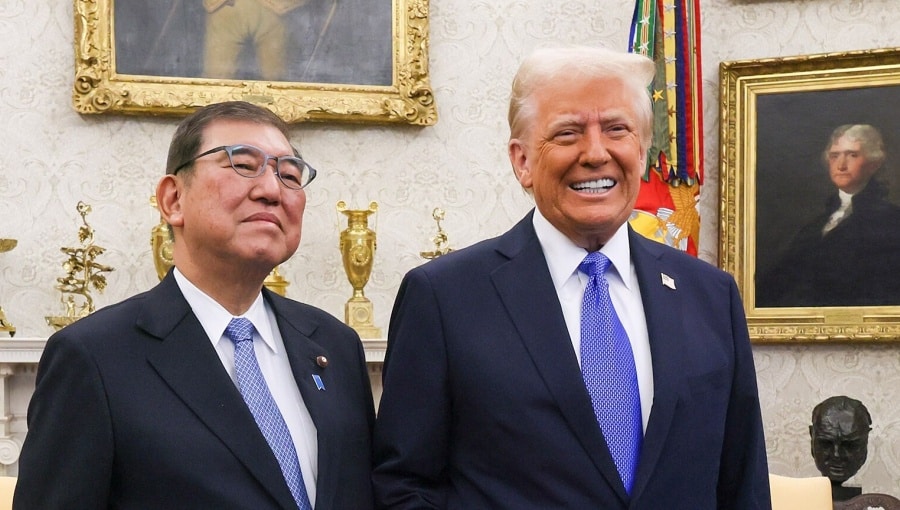Japan’s Far-Right Movement Gains Momentum Amid Trump Influence and Rising Tourism

Japanese politics, often characterized by stability and predictability, has recently experienced a significant shift. In a surprising turn of events, the far-right party Sanseito has dramatically increased its presence in the Japanese parliament, jumping from one seat to 15 in the latest elections. This surge has raised concerns for the ruling Liberal Democratic Party (LDP) and its prime minister, Shigeru Ishiba, who is facing mounting pressure following the LDP’s loss of majority in the upper house. The political landscape in Japan, long seen as unshakeable, is now facing unprecedented challenges.
Economic Struggles and Public Discontent
Japanese households have been grappling with rising inflation and stagnant wages, leading to widespread frustration. The price of rice, a staple food, has doubled in the past year, with a typical 5kg bag now exceeding 4,000 yen (£20). This surge in prices is attributed to a combination of a poor harvest and panic buying triggered by warnings of a potential “megaquake.” Shoppers have been seen queuing in long lines at supermarkets, highlighting the growing concern over food affordability.
Momoko Abe, a mother shopping in northern Tokyo, expressed her shock at the rapid price increase, emphasizing that it affects everyone, not just her family. Similarly, Watanabe Takeshi, a 65-year-old shopper, noted that despite the high prices, rice remains a necessity. In response to the crisis, Agriculture Minister Shinjiro Koizumi has pledged to stabilize prices and improve the supply chain, but the situation remains dire. The rising cost of living is symptomatic of a government struggling to revive the economy and manage inflation, contributing to the electorate’s discontent.
The Rise of Sanseito and Its Appeal
The emergence of Sanseito, which translates to “Participate in Politics,” has resonated particularly with younger voters disillusioned by the current political climate. Many young people, like Eriko Harada and Uta Kato, have expressed their frustration with traditional parties, stating that Sanseito speaks on their behalf. This shift towards a “Japan First” ideology mirrors sentiments seen in other countries, influenced by global populist movements, including those associated with former U.S. President Donald Trump.
Experts suggest that the party’s rise is not solely based on policy but also on its ability to connect emotionally with voters. Sanseito’s founder, Sohei Kamiya, has drawn parallels between his party’s platform and the populist rhetoric seen in the U.S., tapping into fears surrounding immigration and economic stability. As Japan’s population ages and immigration levels rise, the party has capitalized on public concerns about foreign residents and their perceived impact on society.
Tourism and Cultural Tensions
Japan has seen a significant influx of tourists, with nearly 37 million visiting last year, largely due to a favorable exchange rate. However, this surge has also led to cultural tensions, as some locals feel that tourists do not adhere to Japan’s social norms. Incidents of disrespectful behavior, such as graffiti and traffic violations, have fueled resentment among residents, prompting calls for stricter regulations.
Local officials in areas popular with tourists have expressed frustration over the need to impose restrictions due to the actions of a few. Kazuhiko Iwama, a lifelong resident of Fujikawaguchiko, highlighted the dangers posed by tourists who disregard traffic rules. This growing discontent has been leveraged by Sanseito, which has linked these issues to broader immigration concerns, further solidifying its support base.
Sanseito’s Controversial Messaging and Future Prospects
Sanseito’s messaging has sparked debate, with critics accusing the party of conflating isolated incidents of misbehavior with broader immigration issues. Analysts argue that the party has perpetuated false narratives about foreigners contributing to crime and disorder. In response, the LDP has announced initiatives aimed at addressing public concerns about foreign nationals, including a task force to combat perceived misconduct.
Founded in 2020, Sanseito gained traction through social media and controversial statements, appealing to those dissatisfied with mainstream politics. Kamiya’s rhetoric, which includes claims of a “silent invasion” of immigrants, has resonated with voters seeking change. While the party’s success marks a significant shift in Japan’s political landscape, experts caution that it remains to be seen whether this populist trend will endure. The LDP, despite its recent setbacks, continues to hold significant power and experience in navigating Japan’s complex political and economic landscape.
Observer Voice is the one stop site for National, International news, Sports, Editor’s Choice, Art/culture contents, Quotes and much more. We also cover historical contents. Historical contents includes World History, Indian History, and what happened today. The website also covers Entertainment across the India and World.
Follow Us on Twitter, Instagram, Facebook, & LinkedIn

